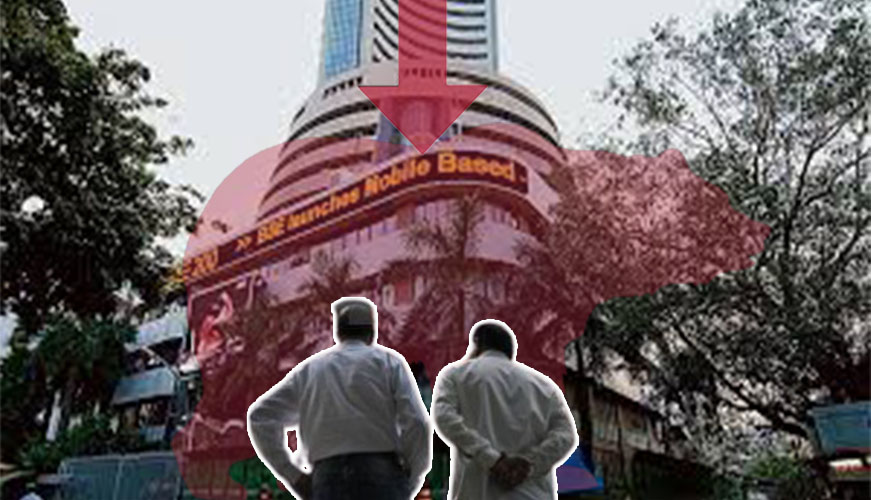
(Photo : BT Creative)
The Indian stock market ended in red.
- The Indian equity market saw a significant downturn due to escalating tensions between Russia and Ukraine.
- The Sensex closed 422 points down, while the Nifty fell below 23,350, affecting large caps, midcaps, and small caps.
- Sectoral indices showed auto, PSU Bank, financial services, pharma, FMCG, metal and energy as top laggards, while IT and realty emerged as major gainers.
- The rupee weakened further due to the dollar scaling higher amid renewed global uncertainties, highlighting the significant impact of geopolitical tensions on global market sentiment.
The Indian equity market recently experienced a significant downturn, with the Sensex closing 422 points down and the Nifty falling below 23,350. This decline was primarily attributed to the weak global sentiment triggered by escalating tensions between Russia and Ukraine, besides the row over Adani Group shares.
Several Adani Group shares, including the flagship firm Adani Enterprises, suffered massive losses and hit their lower circuits in early trade on Thursday, after the group chairman Gautam Adani had been indicted in New York over his role in an alleged multibillion-dollar bribery and fraud scheme. Nearly 23 per cent of the Adani Group companies' share value eroded in a single day.
The Sensex ended at 77,155, down by 422 points or 0.54 per cent, while the Nifty closed at 23,349, down by 168 points or 0.72 per cent. The market trend was predominantly negative, with 1,235 stocks closing in the green, 2,735 in the red, and 95 remaining unchanged on the Bombay Stock Exchange (BSE).
The downturn was not limited to large caps; midcaps and small caps also witnessed a decline. The Nifty Midcap 100 index fell 162 points or 0.30 per cent to close at 54,385, and the Nifty Smallcap 100 index fell 80 points or 0.46 per cent to close at 17,596.
Sectoral Indices and Market Movers
Among the sectoral indices, auto, PSU Bank, financial services, pharma, FMCG, metal and energy were the top laggards, while IT and realty emerged as major gainers. In the Sensex pack, Power Grid, UltraTech Cement, HCL Tech, Kotak Mahindra Bank, Axis Bank, TCS, ICICI Bank, and Infosys were the top gainers. On the other hand, SBI, NTPC, ITC, Asian Paints, Bajaj Finance, Bajaj Finserv, Reliance Industries, IndusInd Bank, Titan, Tata Motors, and HUL were the top losers.
Rupak De from LKP Securities noted that the short-term sentiment remains weak, with support placed at 23,200. He added, A fall below this level could trigger a correction in the market. On the upside, resistance is placed at 23,550 and a decisive move above this level might induce a rally in the market.
The rupee also weakened further to 84.51 as pressure mounted due to the dollar scaling higher above 106.65 amid renewed global uncertainties.
Historical Impact of Geopolitical Tensions
This is not the first time that geopolitical tensions have impacted the Indian stock market. In the past, similar events have led to significant market volatility. For instance, during the 2008 Russia-Georgia war, the Indian stock market experienced a sharp decline due to the global risk-off sentiment. Similarly, during the 2014 Russia-Ukraine crisis, the Indian market faced significant pressure due to heightened geopolitical risks.
Gold prices surged higher as geopolitical tensions reignited safe-haven demand, with renewed concerns over nuclear risks in the Russia-Ukraine conflict. This development underscores the significant impact of geopolitical tensions on global market sentiment.









